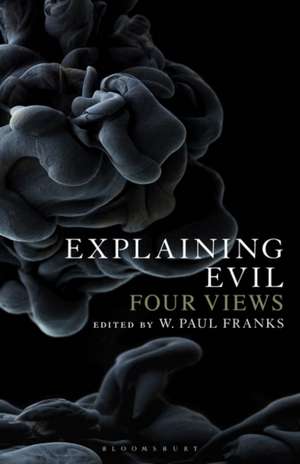Explaining Evil: Four Views
Editat de Dr W. Paul Franksen Limba Engleză Hardback – 20 feb 2019
| Toate formatele și edițiile | Preț | Express |
|---|---|---|
| Paperback (1) | 176.86 lei 3-5 săpt. | |
| Bloomsbury Publishing – 20 feb 2019 | 176.86 lei 3-5 săpt. | |
| Hardback (1) | 537.30 lei 6-8 săpt. | |
| Bloomsbury Publishing – 20 feb 2019 | 537.30 lei 6-8 săpt. |
Preț: 537.30 lei
Preț vechi: 772.20 lei
-30% Nou
Puncte Express: 806
Preț estimativ în valută:
102.81€ • 107.63$ • 85.07£
102.81€ • 107.63$ • 85.07£
Carte tipărită la comandă
Livrare economică 07-21 aprilie
Preluare comenzi: 021 569.72.76
Specificații
ISBN-13: 9781501331145
ISBN-10: 1501331140
Pagini: 192
Dimensiuni: 140 x 216 mm
Greutate: 0.37 kg
Editura: Bloomsbury Publishing
Colecția Bloomsbury Academic
Locul publicării:New York, United States
ISBN-10: 1501331140
Pagini: 192
Dimensiuni: 140 x 216 mm
Greutate: 0.37 kg
Editura: Bloomsbury Publishing
Colecția Bloomsbury Academic
Locul publicării:New York, United States
Caracteristici
The four authors (two theists and two non-theists) represent nearly as broad of a range of views as is possible in a book of this format, so that readers can go to a single book and find all the major starting points (e.g., theism, non-theism, realism, non-realism, compatibilism, libertarianism) for explaining evil presented by highly regarded philosophers
Notă biografică
W. Paul Franks is Associate Professor of Philosophy at Tyndale University College, Canada. He has published in the Heythrop Journal, Philosophia Christi, Religious Studies and Sophia.
Cuprins
Notes on Contributors AcknowledgementsIntroduction, W. Paul Franks (Tyndale University College, Canada) 1. Evil and Agent-Causal Theism, Richard Brian Davis (Tyndale University College, Canada) Response to Richard Brian DavisPaul Helm (Regent College, Canada)Michael Ruse (Florida State University, USA)Erik Wielenberg (DePauw University, USA) Reply to Critics2. Evil and Christian Classical Theism, Paul Helm (Regent College, Canada)Response to Paul HelmRichard Brian Davis (Tyndale University College, Canada) Michael Ruse (Florida State University, USA)Erik Wielenberg (DePauw University, USA) Reply to Critics3. Evil and Atheistic Moral Skepticism, Michael Ruse (Florida State University, USA)Response to Michael RuseRichard Brian Davis (Tyndale University College, Canada) Paul Helm (Regent College, Canada)Erik Wielenberg (DePauw University, USA) Reply to Critics4. Evil and Atheistic Moral Realism, Erik J. Wielenberg (DePauw University, USA) Response to Michael RuseRichard Brian Davis (Tyndale University College, Canada) Paul Helm (Regent College, Canada)Erik Wielenberg (DePauw University, USA) Reply to CriticsRecommended ReadingBibliography Index
Recenzii
The tone is civil, but the critical interactions are lively and uninhibited ... The book is rounded out with an excellent recommended reading section . and an extensive bibliography emphasizing recent (some of it very recent) literature. Summing Up: Highly recommended. Upper-division undergraduates through faculty.
This an outstanding book on the problem of evil. Instead of addressing the enduring debate over the value of evil as evidence against theism, the contributors to this book consider how evil fits into their theistic or atheistic perspectives. Anyone interested in the problem of evil-even those who feel that they have already read enough about the topic-should find the book intriguing and eye-opening.
Encountering Evil is an interesting volume, and worth a read. The book provides a concise overview of four approaches relevant to discussions of human morality, and relevant to discussions of the problem of evil. The book would provide a useful textbook for an undergraduate seminar on theism and morality, or a seminar on the problem of evil.
What a splendid book this is! [A]ll four make many excellent points. Would that all academic debates could be conducted in such a respectful manner.
This an outstanding book on the problem of evil. Instead of addressing the enduring debate over the value of evil as evidence against theism, the contributors to this book consider how evil fits into their theistic or atheistic perspectives. Anyone interested in the problem of evil-even those who feel that they have already read enough about the topic-should find the book intriguing and eye-opening.
Encountering Evil is an interesting volume, and worth a read. The book provides a concise overview of four approaches relevant to discussions of human morality, and relevant to discussions of the problem of evil. The book would provide a useful textbook for an undergraduate seminar on theism and morality, or a seminar on the problem of evil.
What a splendid book this is! [A]ll four make many excellent points. Would that all academic debates could be conducted in such a respectful manner.
